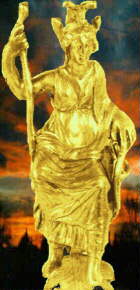





capite velato*, and recites these words:}
DOMINA, ANTIQVA, MATER VRBIS AETERNAE.
ADES! SALVE PALATVA
{supplicant performs the Adoratio, and continues:}
TE
{touching breast)
PRECOR QVAESOQVE
VT DES PACEM PROPITIA VENIAMQVE
VRBI ET ORBI;
VTI NVNQVAM DESOLES TVAM POPVLVM ROMANVM,
HIC ET NVNCT VBICVMQVE ET SEMPER.
ERGO TIBI OFFERO HOC THVS:
{The supplicant now offers a few grains of incense upon the fire ...
ITA EST! ILLICET.
{The rite is ended}
|
|
Nota Bene: *capite velato: with the head veiled
|
* By linguistic connection, Palatua seems intimately connected with Pales, known separately from Italic and Etruscan traditions, and with Pallas Athena, whose sacred Palladium was carried by Aeneas from burning Troy. * In this consideration, Palatua should be specially honored on two dates: The Parilia, XI.KAL.MAI. (21 April), the traditional date of Rome's founding, in which milk and cakes were offered, and Festival of the Pales, NON.IVL. (7 July), in conjunction with IVNO CAPROTINA, whose NONAE CAPROTINAE is a feast of the wild fig, recalling the serving women who thwarted an army's advance on Rome. * What is completely certain about Palatua is her eternal guardianship of the famed Palatine Hill, the wellspring of our timeless civilization. Her name is the root of "palace", a supreme edifice of grandeur, and we may suggest further that Her connection to the Palatine parallels that of Quirinus to the Quirinal. Quirinus is sometimes identified with the deified Romulus, or Mars in His peaceful aspect. In Palatua I feel a harmony of the bucolic arts with those of more urbane nature, just as the Parilia celebrates the pastoral life of shepherds as well as the foundation of the City. It's intriguing to compare similar aspects in Magna Mater, whose Temple came naturally to grace the Palatine: her epithet of VRBIVM CONDITRIX and her love for and resurrection of the shepherd Attis. |
Votive offering of Iulia Vopisca, Flaminica Palatuali
* ID OCT AVC MMDCCLV *
15 Oct 02 * |
|
Return to my main index |
